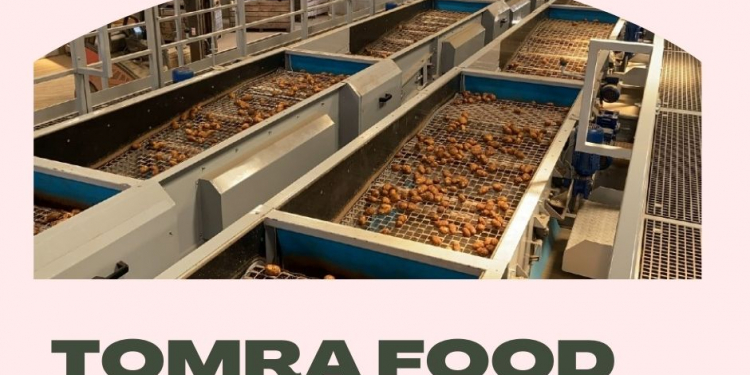TOMRA Food, the leading manufacturer of sensor-based sorting machines for the food industry, has announced that it will run machine demonstrations at BP2021, the UK-based potato industry event later this month.
Visitors to the two-day biennial exhibition (Yorkshire Event Centre, Harrogate, November 24th/25th) will be able to see how effectively the TOMRA 3A optical sorter removes foreign materials, soil clods, stones, and ‘greens’ from freshly harvested potatoes.
TOMRA can be found in Hall 2, Booth 212 at BP2021.
TOMRA 3A, a sorting machine designed and built for growers
The TOMRA 3A is typically located near the entrance to a potato storage shed, where it cleans up freshly harvested crop after it passes through a mechanical grader and soil removal equipment. This machine is designed to operate at high capacity, working at a rate of up to 100 tons per hour, and is compact enough to be moved easily from shed to shed.
The TOMRA 3A incorporates high-resolution cameras and near-infra-red (NIR) spectroscopy. These inspection technologies can distinguish between organic matter (the crop) and inorganic matter (foreign materials), identify zero-value green potatoes, and recognize good crop worth keeping even if it is heavily coated in soil. Optical equipment has no moving parts, to minimize maintenance requirements, and is located in a fully-sealed box, to withstand rain, wind, dust, and heat.
The TOMRA 3A is so effective, it removes 95% of rocks, floating stones, dirt clods, and corn cob, plus 85% of other typical foreign materials. This means the potato grower’s customers (typically packers and processors) can be confident of receiving high-quality product which contains little or no unwanted materials or unacceptable crop.

Another advantage of using an optical sorter, at a time when more growers are finding it difficult to recruit staff, is that it reduces dependence on manual labour, as well as making it possible to redeploy staff further down the line where they can do more to add value by further enhancing product quality.
Additionally, the TOMRA 3A greatly reduces the amounts of unsaleable materials going into the storage shed. This makes better use of precious storage space, eliminates the expense of keeping cool materials that have no value, and reduces the risks in storage of potato rot, breakdown, and product loss.
The TOMRA 3A can be connected to the cloud-based data platform TOMRA Insight, available as a subscription service. Accessing live data from sorting machines enables operators to make improvements to line efficiencies; accessing historical data makes it possible to quantify the standard of raw materials from suppliers and make better-informed business decisions.
Hear about the user-experience
One potato grower who has seen what the TOMRA 3A can do is Joe Button, owner and manager of Cornwall-based E.W. Button & Son. Last year this business opened a new grading facility for its early season and ware tubers, incorporating TOMRA’s sorter in a line of equipment supplied by Haith, UK- based specialists in the design and manufacture of root vegetable and potato processing machinery.
The potatoes are tipped into a Haith Supa-Flow Bulker and the dirty crop is run through a Haith Evolution Multi-Separator before it is inspected by the TOMRA 3A. After the sorter has ejected unwanted materials, including green potatoes, the accepted product enters a series of eight Haith Supa-Flow screen graders.

Button & Son has seen improvements in product quality and yield, and at the same time, there has also been a 35% increase in throughput speeds so investing in this equipment was well worth it.
Ken Hollingsworth of Haith’s UK sales team said: “Haith has an excellent relationship with TOMRA which goes back more than 20 years and has led to the installation of more than 100 TOMRA sorting machines.
“We recommended the TOMRA 3A to Joe Button because we know how well it removes stones, clods, foreign materials, and greens.
“This reduces dependency on labour and allows workers to be moved to more valuable tasks further down the line. And unlike manual sorters, machines don’t get tired, bored, or lose concentration, so their performance remains excellent all the way through a shift.”
UK-based potato growers who would like to see the TOMRA 3A in action but who cannot attend
BP2021 are invited to see one in operation at a grower’s facility. TOMRA Food can make arrangements for site visits to E.W. Button & Son in Cornwall or growers in Shropshire and Scotland.







